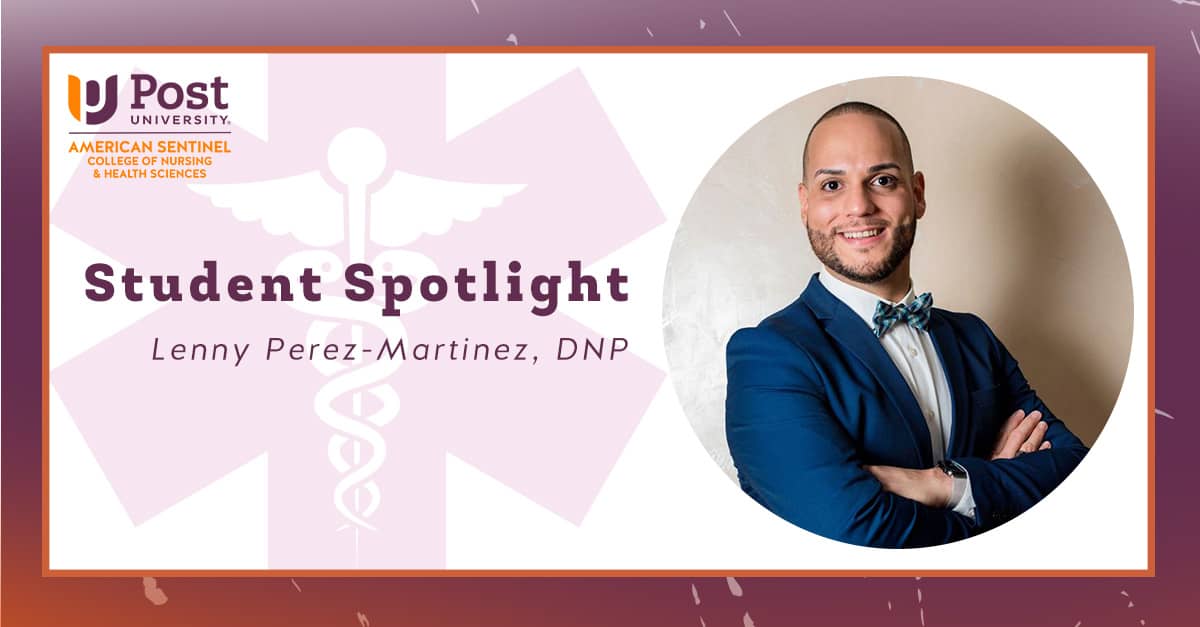Lenny Perez-Martinez considers his nurturing upbringing as the inspiration for becoming a nurse. “I am someone who has a lot of love for family and community,” says Lenny, who was born and raised in Puerto Rico, and has worked there for his entire career. He graduated with a BSN in 2010 from the University of Puerto Rico-Mayaguez, and began his career as an emergency room and intensive care unit nurse at Mayaguez Medical Center and Hospital de La Concepcion.
Home healthcare and an MSN
In 2013, Lenny became a clinical field supervisor for Advanced Home Care West Services, a home health provider. That’s also when he decided to earn the MSN at Ana G. Mendez University—and try teaching. He joined ICPR Junior College as a part-time instructor in the Associate Degree of Nursing program.
“I love to help future professionals acquire the knowledge and skills they need so that they can help patients and be successful,” says Lenny, who returned to a hospital setting in 2016 when he and joined Hospital Metropolitano de San German as a nursing supervisor. His MSN focus was Nursing Clinical Specialist with a specialty in critical care of the adult with secondary roles in administration and education in nursing. This qualified him to be Clinical Nurse Specialist certified, a designation he earned in 2017.
Full-time teaching in 2018 at National University College, School of Nursing
After teaching at several places, Lenny became a full-time nursing faculty member at National University College, School of Nursing, in Puerto Rico. “I wanted to secure a role in academia to reach a diverse population and teach proactive measures through practice and community,” he explains. “Academia presents constant challenges, which requires us as faculty members to keep up to date with the latest advancements. That way, we can help mentor future nursing professionals to achieve their goals and strive toward performance excellence.”
American Sentinel University’s Doctor of Nursing Practice Educational Leadership
In fall 2019, Lenny decided the time was right to further his own education—with a doctorate. “As a nursing educator, it’s important that I improve my own skills and education so I have the tools to better prepare tomorrow’s healthcare team members,” he says. “The changing demands of Puerto Rico’s complex healthcare environment require the highest level of scientific knowledge and practice expertise to assure quality patient outcomes. My way of pursuing this goal is to complete my doctoral studies. When researching programs, I found American Sentinel University, and their accreditations, curriculum and program flexibility were a great fit with my career aspirations.”
Promoted to Nursing School Director, December 2019
The decision to enroll in the Doctor of Nursing Practice Educational Leadership program paid off for Lenny quickly. In December 2019, he was hired as the director of the School of Nursing at National University College. “Having my doctorate underway definitely helped make me the right candidate for this position, along with working as a nursing instructor and nurse administrator,” he says.
Lenny adds that obtaining a doctorate degree is helping him strengthen the programs he leads—which helps students get the most out of their programs. “I’ll widen my knowledge base and fortify my strengths.”
Patients as people
As he navigates his new nurse education leadership position and the world post-COVID-19, Lenny says that American Sentinel’s emphasis on patients as people is one that he admires. “American Sentinel emphasizes a balance between academic theory, research, and hands-on training,” he says. “I’m excited about this opportunity to expand my clinical knowledge, critical thinking, and leadership abilities. Especially in today’s pandemic, my focus is to be a nursing professional committed to competent, trustworthy clinical practice.”
Inspired by Lenny’s story? A DNP with a specialization in educational leadership prepares master’s-educated nurses for leadership roles in nursing education programs. When you acquire new knowledge, you can apply it to nursing practice in ways that enhance patient care and improve outcomes.
